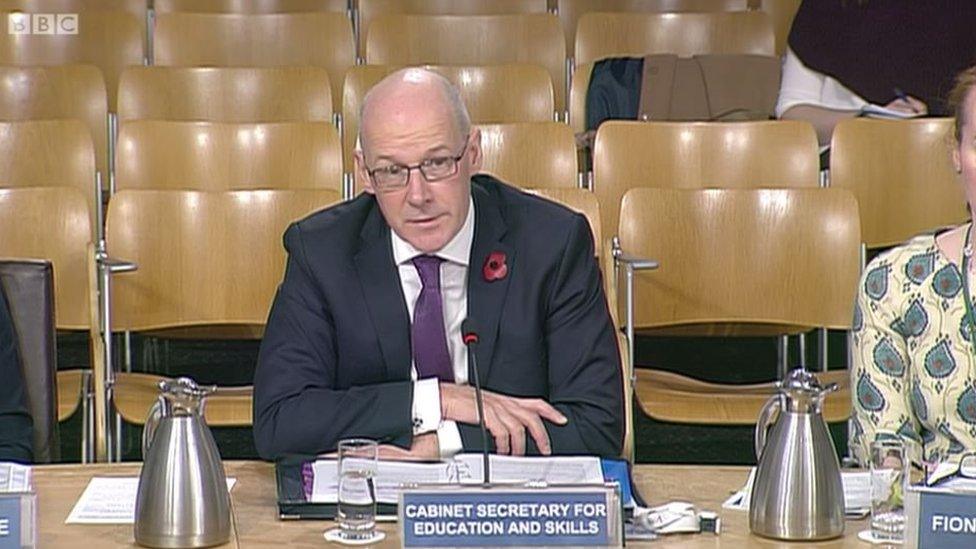John Swinney lays out plans for regional education boards
- Published

Education secretary John Swinney has set out the thinking behind controversial plans for new regional education boards.
The boards will encourage co-operation between schools in different council areas.
Mr Swinney told MSPs not all practice in learning and teaching was good enough.
He argued the boards could play a part in helping to avoid duplication between different councils to save cash.
Mr Swinney made the remarks under examination by MSPs on Holyrood's education committee.
The government is consulting over moves to reform the governance of schools. It wants to give as much power as possible to individual schools and headteachers and create the new regional boards which will operate across council areas.
Details of just what powers the boards will have and the regions they will cover have still to be decided.
It has said councils will retain legal responsibility for schools and insisted councils will still have an important part to play.
However some in local government - which is fiercely protective of its traditional role in the education system - wonder what practical powers they will retain.
Mr Swinney explained that the plan for regional boards stemmed from the government's aim of closing the attainment gap - the gap between how well children from relatively rich and poor backgrounds do. He told them an OECD report on Scottish education had challenged the government to ensure there was more collaboration.
'Not good enough'
He said the quality of learning and teaching was central to closing the gap.
Mr Swinney told the committee: "To be honest about it, I'm asking the question are all of our local authorities adding as much value to that learning and teaching experience on an equal basis?
He added: "I think - and it's not just my opinion on that - Audit Scotland assessments about the capabilities of education authorities vary significantly around the country and I can't afford to ignore that because if I'm interested in closing the attainment gap in every part of the country it's not good enough to... resign ourselves to the fact that one authority is a fabulous education authority that adds lots of value to the learning and teaching experience and another authority at the other end of the spectrum doesn't do so. That's not fair to young people.
"So this isn't some abstract lines on a map discussion that I'm raising. I'm raising an issue about what enhances the learning and teaching of young people in our country and we have to be honest enough to confront it and not all the practice that is undertaken in our country adds enough value. And that's got to be addressed."
Mr Swinney praised the joint work on education done by councils in north east Scotland and the Highlands and islands through a co-operative group called the Northern Alliance.
But he expressed frustration at the limited progress which had been made by some other local authorities in the rest of Scotland, both in education and local services more widely.
Raise attainment
He said: "If we're doing things 32 times then I venture to suggest in a tight financial climate there are ways we could collaborate to save money for local authorities... in avoiding the need for replication."
The Scottish government has encouraged councils to look at ways they can work more collaboratively with each other and with other public services. It deliberately avoided telling them what to do, arguing what was right in one area may not be right somewhere else.
However there has been far less progress towards so-called "shared services" than many had predicted.
Councils have a pivotal role in the Scottish education system - virtually all state schools are run by councils and there are no provisions to allow schools to opt out of local authority control. Councils employ teachers, take responsibility for school buildings and decide just how much to spend.
The government is already committed to giving £100 million straight to headteachers to help raise attainment through changes to the council tax. Some in local government are angry that money raised in one council area may end up spent somewhere else.
It is also discussing whether there should be a national funding formula for schools to help ensure spending is consistent and based on educational need or the challenges facing an area.
Raising attainment levels
Larry Flanagan, the general secretary of teachers' union the EIS, said: "We are currently taking the views of members to support a formal response to the Scottish government's consultation on the review of governance.
"However, from the EIS point of view, the priority must be enhancing the support for schools and teachers and ensuring a consistent high-quality educational experience for pupils in all parts of the country. Rather than focussing on structural changes, the review should concern itself with how teaching and learning can be enhanced and professional collaboration supported.
"The role and remit of the proposed regional boards, and any value that this additional structural layer might bring, remains unclear and the key question over the benefit this would bring to schools, teachers and pupils remains to be answered."
A spokesman for Cosla said: "We note Mr Swinney's comments with interest as they come on the back of a very successful event held by Cosla yesterday looking at this very issue.
"Over 120 officers and politicians came together from all areas of Scotland and a number of existing regional collaborations were showcased. Mr Swinney was in attendance and would have noted that many of these existing partnerships are looking at the very issues covered by the education governance consultation.
"Local government, day in/day out, are absolutely committed to raising levels of attainment and addressing the attainment gap.
"A number of challenging questions were posed to Mr Swinney at the event and it was clear that Scottish government and local government should work together to focus on the children and young people and to support them in every aspect of their lives and to ensure that our teaching staff are supported to do so."


Analysis by BBC Scotland education and local authority correspondent Jamie McIvor
Reforming the governance of education may lead to a huge row between some councils and the Scottish government.
Councils are fiercely protective of their role in the system - education is the biggest, and arguably most important, council service.
But, in a sense, it is a national service that local government has historically been entrusted to provide.
Tensions have often erupted - in the past and now - when councils and national politicians have different expectations.
Mr Swinney's remarks could be loosely paraphrased as a statement of the obvious: some councils aren't doing as well as others and that this is unacceptable.
The powers of the new regional educational boards have still to be decided.
'Swam against the tide'
One question many in local government are asking is whether they will devolve power down from Holyrood or suck power up from individual councils.
Coupled with plans to devolve as much power as possible to individual schools, some in local government wonder just what practical powers and responsibilities over education they will retain.
Scotland has 32 councils - an attempt to create a joint education department covering both Stirling and neighbouring Clackmananshire came to an end. But having so many education authorities is a modern development which, some might argue, swam against the tide.
Between 1975 and 1996, education was the responsibility of nine regional authorities such as Strathclyde. Some in local government claim there has been a 50 year trend towards centralisation in Scotland with recent rows, such as the creation of a national police force and fire service, simply the latest examples.
But this row over power and responsibility could be just as significant as the debate over what can be done to raise attainment in schools.
